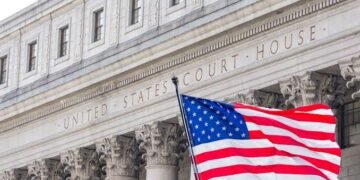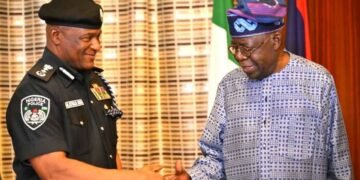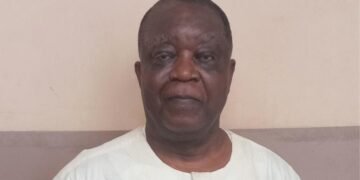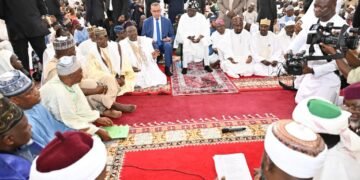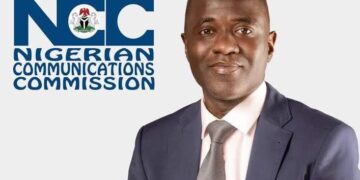By Musa Ilallah
In my attempt to open the discussion on Nigeria’s external and domestic debt status and its implication on her economy, i find it very convenient to lay a foundation by giving a global perspective of current indebtedness of countries around the world.
Talking about Debt to GDP Ratio in 2021, a list of the top ten countries in the world with the most national debt shows that Japan’s National Debt is put at ¥1,028 trillion ($9.087 trillion); Greece’s €332.6 billion ($379 billion); Portugal €232 billion ($264 billion); Italy €2.17 trillion ($2.48 trillion); Bhutan $2.33 billion; Cyprus €18.95 billion ($21.64 billion); Belgium €399.5 billion ($456.18 billion); United States of America $19.23 trillion; Spain €1.09 trillion ($1.24 trillion) and Singapore $350 billion.
Japan, with its population of 127,185,332, has the highest national debt in the world at 234.18% of its GDP, followed by Greece at 181.78%. After the stock market crashed in Japan, the government bailed out banks and insurance companies and provided them with low-interest credit. Banking institutions had to be consolidated and nationalized after a period of time and other fiscal stimulus initiatives were used to help reboot Japan’s struggling and ailing economy. Unfortunately, these actions caused Japan’s debt level to skyrocket.
Coming back home, Nigeria’s current debt has a link to its Independence in 1960 and up to the 1970s when there was no serious credit problem facing the country. Nigeria was ranked among the 15 heavily indebted countries in the world with crippling debt burden. Thus in the early 1970s the country’s external reserve rose sharply due to the increased importance of crude oil. Today, the story has changed for the worst due to a number of reasons beyond human control.
The country took off with a cautions debt policy which led to the first major borrowing from the international capital market. The current back and forth argument in support or mischievously against the PMB administration taking more foreign loans by experts, politicians and even lay men alike have continued to attract public attention and scrutiny for some time now.
President Muhammadu Buhari’s government has been unjustly criticized and accused of plunging Nigeria into debt accumulation by nay sayers thus forgetting previous accumulated debts, purposes for which they were gotten and put to use and financial fortunes of government side by side with the current situation.
According to the Nigeria Extractive Industries Transparency Initiative, NEITI’s 10-year (2010-2019) report, the aggregate financial flows from the oil and gas sector to Nigeria amounted to more than $418.54bn out of which $300bn was earned under the administrations of the now opposition Peoples Democratic Party, while $100bn accrued over a five year period under the Buhari administration. Within the period under review, the highest revenue flow of $68.44bn was recorded in 2011 alone. This much money vanished without traceable impact on infrastructure development and the citizenry during the period.
In what could be described as a veiled reference to the Buhari government, former President Olusegun Obasanjo recently said “it is criminal to accumulate debts for the next generation.” I wonder if there is today any country in the world that is not indebted. Like it is always put forward in justification of countries taking debts, ‘debt is a necessary evil’. What i think matters most is for countries to have the capacities to repay loans and also to use such loans judiciously for the purposes for which they were taken. I have no doubt in my mind that Nigeria under the leadership of PMB has what it takes to use the loans as taken and work with the repayment plan while in power.
According to Nigeria’s debt management office, DMO Nigeria’s Public Debt Stock is N33.107 trillion (about $ 87.239 billion dollars) as at March 31, 2021. Sadly, a lot of varying figures of Nigeria’s foreign and domestic debts are being dumped on the public by those who dont mean well for the country and are undoubtedly waging relentless war to paint the government red for personal pecuniary gains.
Nigeria’s Minister of Finance, Zainab Shamsuna Ahmed had assured Nigerians that there was no cause for alarm in the debt hanging on its neck. Government has capacity to use the funds according to the terms of the loans in usage and repayment.
Available records show that the Peoples Democratic Party(PDP) which ruled the country from the country’s return to democracy in 1999 up to 2015 when Nigerians voted it out of power, bequeathed a national debt of $63bn; a Joint Venture, JV cash call debt of $6.8bn or N2.6tn owed International oil companies, IOCs and a debt owed local contractors running into trillions of naira.
Inspite of an earning of $381.9bn or N144.7trn from crude sales alone between 2010 and May 2015, Nigerians can not sill understand why the then PDP administration still handed over a debt of $63bn with little or nothing to show in infrastructural development for the huge funds generated.
Speaking at this year’s UNGA in New York, United States of America recently, President Muhammadu Buhari called for fair and equitable trade as it would eventually eliminate the need for aid, adding: “My country and indeed all African countries do not intend to stay indefinitely looking for aid. All we need is a fair and equitable system of international trade.”
While strongly calling for outright debt cancellation for countries facing the most severe challenges in the wake of the COVID-19 pandemic, PMB noted ‘‘developing countries have been faced with unsustainable debt burdens even before the pandemic. The COVID-19 pandemic has increased the risk of a new wave of deepening debt, where vital public financial resources are allocated to external debt servicing and repayments at the expense of domestic health and financing for critical developmental needs.”
In commending current initiatives by international financial institutions and the G20 aimed at significantly mitigating the economic situation of the indebted countries, he stressed the need to urgently consider expansion and extension of the Debt Service Suspension Initiative and outright debt cancellation to include all Developing, Least Developed Countries and Small Island Developing States facing fiscal and liquidity challenges.
In his defence of such loans and to counter series of orchestrated campaigns to discredit government, Minister of Information and Culture, Lai Mohammed had explained that the Federal Government is borrowing to build world-class infrastructure and not for recurrent expenditure.
In his opening address at a town hall meeting organised by his ministry on destruction of telecommunications and power infrastructure in Borno State, he said government had achieved so much with the borrowed funds in the areas of rail line and road construction, airport upgrade and power infrastructure among others.
The legislative arm of the government, particularly the Nigerian Senate, which constitutionally approves all loan requests from the Federal and state governments was not left out in the defence of the governments’ loans for development purposes. The Chairman, Senate Committee on Finance, Senator Solomon Olamilekan Adeola blamed Nigeria’s current debt burden on previous administrations in the country dating back to the military era.
Speaking during consideration of the 2022-2024 Medium Term Expenditure Framework and Fiscal Strategy Paper, Senator Adeola, commenting on concerns by some Nigerians, said “It is an accumulated loan, it is not a loan that says that it is the current administration of President Buhari that has borrowed. It is a loan that has been borrowed by the previous administrations of the Obasanjo, the Jonathan, the Yar’Adua of this world and since the business of government is a continuum, the President of the day has no choice but to continue to pay back all these loans that have been borrowed by the previous administrations.”
“More than three-quarters of these loans you’re seeing were borrowed by the previous administrations, and we are paying back – we are doing what is supposed to be done, the way it is supposed to be done.”
In logically illustrating how much loans taken by previous governments but being settled today by the PMB administration, Senator Adeola said: “for every sixty-seven naira of any loan that was borrowed, more than sixty naira of it are loans borrowed by previous administrations.”
The Senate President, Ahmad Lawan, in his concluding remarks at the presentation, blamed Nigeria’s economic predicament on the failure of past governments to prioritise the provision of critical infrastructure.
Justifying continuous borrowing by the present government, Senate President Lawan said ‘the situation has left the present administration with no other viable option but to seek external borrowing to fund capital expenditures in the national budget especially against the background of dwindling oil earnings and the dependence on imports, which contributed to the emergence of trade arrears.
In an apparent attack on previous governments for not making adequate plans to save for the future, Senator Lawan added: “When you don’t make hay while the sun shines, this is the kind of thing you face. When we had plenty of money, we didn’t prioritize the construction of infrastructure in Nigeria. We wasted our resources when we had much.
“Today, we realize we need to construct infrastructure because that is the only way to develop the country. Unfortunately, we don’t have the kind of resources we had before”.
The Buhari Media Organisation, BMO on its part, while commending the Senate for shedding more light on salient issues on Nigeria’s debt profile estimated at N33 trillion, noted that the difference between the debt taken in the Buhari era and those accumulated in the PDP years is prudence and financial management.
BMO in a statement signed by Niyi Akinsuji and Cassidy Madueke, Chairman and Secretary respectively, explained that the difference between this government and the previous governments was very clear as the loans taken by this government are tied to specific projects including the Lagos-Ibadan railway project, the Abuja-Kaduna-Kano express way, airport expansion projects and the Second Niger Bridge, AKK gas pipeline project amongst others which have either been delivered or are taking shape.
It is therefore not in doubt that all loans taken by the Buhari administration would be used for the purposes for which they were taken. President Buhari has himself severally pledged to do the needful.


